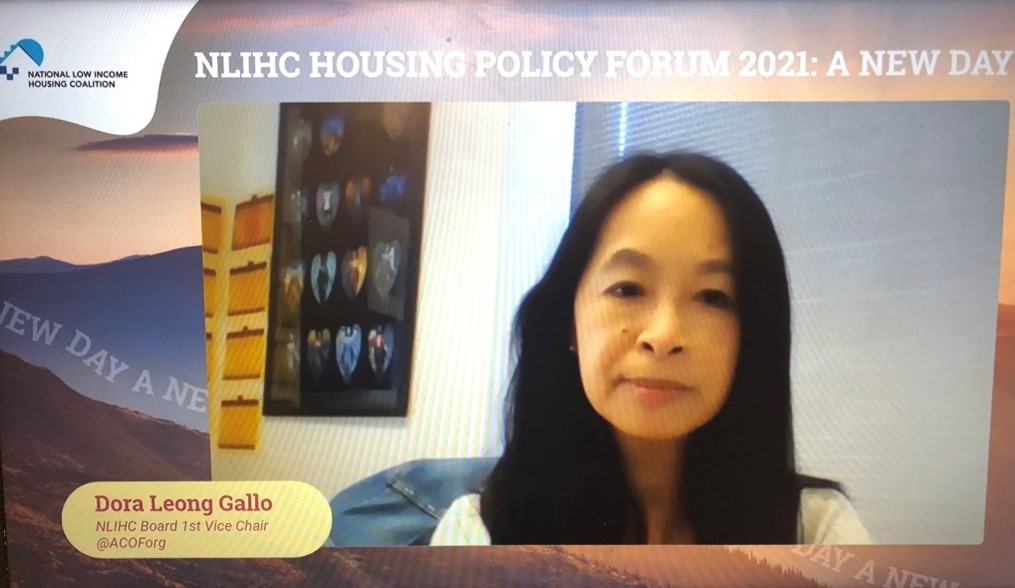Over 1,100 Attend NLIHC’s 2021 Virtual Housing Policy Forum Featuring HUD Secretary Fudge, Members of Congress, and Much More
Apr 05, 2021
More than 1,100 housing advocates from around the country participated in NLIHC’s Virtual Housing Policy Forum 2021: A New Day on March 30-31. The Forum featured a conversation with HUD Secretary Marcia Fudge, her first at a housing conference in her new role, and special presentations from Senators Elizabeth Warren (D-MA), Rob Portman (R-OH), Ron Wyden (D-OR), Brian Schatz (D-HI), and Chris Van Hollen (D-MD), and Representatives Joyce Beatty (D-OH), Jesús “Chuy” García (D-IL), and Mario Diaz-Balart (R-FL). There were also speakers and panels on Racial Equity and Housing Justice; Best Practices in Organizing; Legislative Opportunities to Advance Housing in 2021; State and Local Emergency Rental Assistance Programs; Achieving Universal Housing Assistance; Lessons Learned from COVID-19 and the Need for Structural Reform; and Sharing Stories of Lived-Experience to Bring About Change.
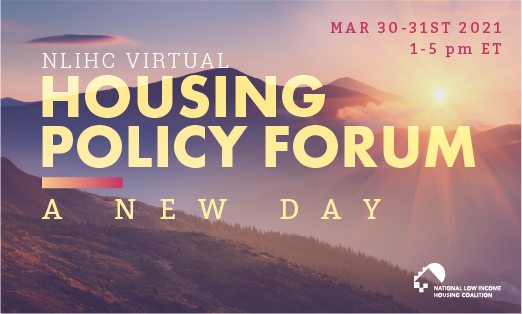
A highlight of the Forum was a live conversation between HUD Secretary Marcia Fudge and NLIHC President and CEO Diane Yentel. Secretary Fudge noted that following the CDC’s pandemic prescription of “staying home” was not a possibility for many Americans - those without homes - and she said her vision for HUD is to create an environment in which all people have a place to call home. She called the unprecedented housing and homelessness resources provided through the American Rescue Plan, the December COVID-19 relief bill, the CARES Act, and the Biden administration’s new infrastructure bill provide an opportunity to achieve “generational change.”
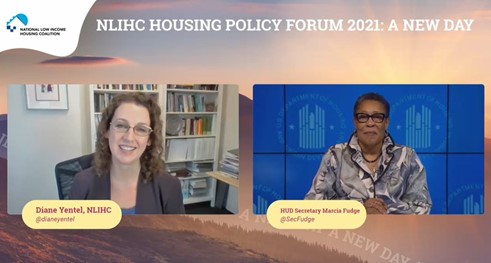
Secretary Fudge emphasized that HUD and other stakeholders such as NLIHC will play a critical role in ensuring that COVID-19 housing rescue funds are distributed effectively to those most in need. While the Department of Treasury will provide vital emergency rental assistance money, she said, HUD will provide much-needed guidance. Secretary Fudge said that racial equity will always be at the top of her agenda, that “fair housing is the law of the land. I have sworn to uphold the law, and I intend to do that.” She said that she and the administration are looking at how to reverse decades of racial inequities from U.S. housing policies that were “designed to keep certain people poor.” The administration, she said, is committed to leveling the playing field and centering equity in all their efforts. Diane asked the secretary what opportunities she sees to improve and expand programs and to achieve universal housing assistance. Secretary Fudge commented briefly on the president’s “American Jobs Plan,” released the morning of her appearance at the Forum, and the approximately 2 million new housing units it would produce and the many existing homes it would rehabilitate. She cited the president’s commitment to pursuing universal housing assistance for all eligible households and emphasized her commitment to involve those with lived experiences in informing policy decisions. Secretary Fudge ended by acknowledging the moment: “[This is] a critical place in time in this country’s history – where we can tip the scales toward justice and equality.”
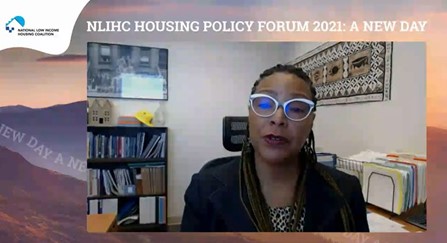
NLIHC Board Chair Marla Newman
After welcoming remarks from NLIHC’s Board Chair Marla Newman, Diane opened the Virtual Policy Forum with an “Overview of 2020 and Prospects for 2021 and Beyond.” She congratulated and thanked the advocates attending and called for continued action to build off the policy successes of the last year. “During a time of tremendous change, fear, loss, struggle – personally and professionally – each of you rose to the challenge of working to keep unhoused people and low-income and marginalized renters safe, healthy and housed during this unprecedented global health crisis,” Diane said. “We must build off our successful advocacy to achieve the anti-racist policies and significant, sustained investments to end homelessness and housing poverty, and achieve housing justice.” Diane emphasized the four pillars of NLIHC’s new HoUSed campaign:
- Universal rental assistance for all income-eligible households
- Investments in the construction and preservation of deeply affordable homes
- Permanent emergency rental assistance for households in crisis
- Advancing robust renter protections
“This is a New Day, a once-in-a-generation opportunity, and we are powerfully positioned to seize it,” she said. “2020 was the year that changed us all; 2021 will be the year we begin to end homelessness and housing poverty, once and for all.”
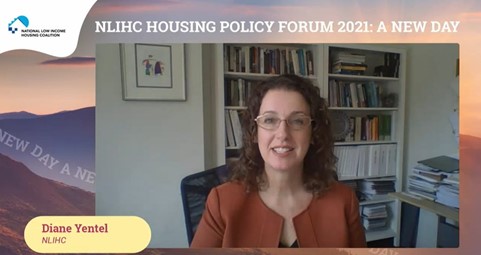
A session on “Racial Equity and Housing Justice” focused on ways advocates can leverage their power to dismantle systems creating profound racial disparities in housing. Panelists were Dr. Tiffany Manuel, president & CEO, The Case Made; Rasheedah Phillips, managing attorney for housing policy, Community Legal Services of Philadelphia; and Susan Thomas, president, Melville Charitable Trust. They shared how advocates can explicitly advance racial equity. Dr. Manuel shared how to advocates can make the case for affordable housing while at the same time centering racial equity and advised organizations to “do the internal work first.” Rasheedah Phillips discussed a recent report produced by the Community Legal Services of Philadelphia analyzing the impact of COVID-19 on race and housing security across the city. She described the current eviction crisis in Philadelphia as a “collision of disastrous forces.” Ms. Phillips said that truly transformational housing justice work builds power, skills, and knowledge in our communities. “Building Black futures requires an end to racist housing policies,” she said. Susan Thomas referred to theme of the Forum “A New Day,” noting it is indeed a new day of opportunities, but “it won’t be a new day if we do things in the same way.” She called on the audience to expressly target and dismantle structures and systems that have oppressed Black, Indigenous, and people of color communities throughout our history. Ms. Thomas implored organizations to "stop thinking about racial equity as a project or initiative, it is the ongoing work."
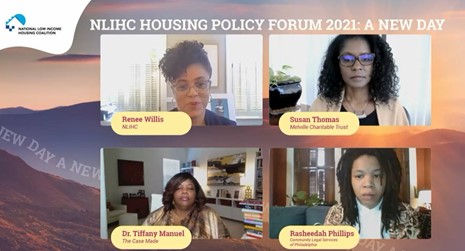
A panel on “Lessons Learned: COVID-19 and the Need for Structural Reform” discussed the ways the pandemic exposed significant gaps in our housing and homelessness safety net, exacerbated racial inequities, and underscored long-overdue and needed structural reforms. Moderator and NLIHC Vice President Sarah Saadian spoke of the need for universal housing assistance, which could have prevented tens of millions of the lowest-income and most marginalized renters from being at risk of losing their homes. Nan Roman, president and CEO of the National Alliance to End Homelessness, made the connection between health and housing, and shared ways that congressional resources provided in the American Rescue Plan Act could be transformational. Dianne Enriquez, co-director of Community Dignity Campaigns with the Center for Popular Democracy, called for robust renter protections and the need to prevent large corporate landlords from buying distressed properties. Marc Dones, executive director at the National Innovation Service, shared how the pandemic and economic fallout disproportionately harmed Black and Indigenous communities, widening racial inequity.
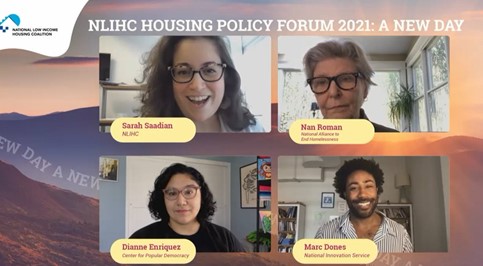
During a session on “State and Local Emergency Rental Assistance Programs,” Xochitl Maykovich (from the King County Department of Community and Human Services), Hugo Ramirez (from the San Francisco’s Mayor’s Office of Housing and Community Development), and Verónica Soto (from the San Antonio Neighborhood and Housing Services Department) discussed key lessons learned and current challenges. In San Antonio, the program hired benefits navigators to connect tenant-applicants with other resources to boost their stability. In San Francisco, the program worked with embedded community partners to reach their most vulnerable tenants and kept the application simple. King County identified and leveraged a unique feature in their housing market: most tenants who were impacted by the economic fallout of COVID-19 rented from large landlords, and King County created a component of the program for landlords to apply in bulk on behalf of all tenants in their properties. All three program administrators shared similar frustrations with the constraints the Treasury Department places on self-attestation and the excessive length of time required, and thus additional administrative capacity and resources required by the programs, to give landlords a chance to participate. All three program administrators carefully considered how to boost housing stability through their programs. San Antonio and San Francisco are both using some of their Treasury emergency rental assistance towards housing relocation or paying future rent, but all three administrators noted that further resources and policies are needed to address the pre-existing housing crisis.
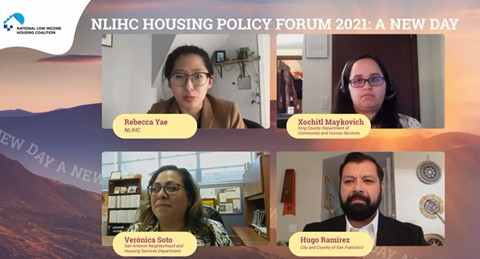
A session titled “Members of Congress Address Affordable Housing” began with a discussion between Diane and Senator Chris Van Hollen (D-MD), who serves on the Senate Banking, Housing, and Urban Affairs Committee. Diane thanked Senator Van Hollen his leadership on affordable housing and for pushing for robust emergency rental assistance during the pandemic. Senator Van Hollen said the $50 billion dollars Congress has approved for emergency rental assistance is critically important but the current housing issues are “part of a much larger problem and broken system.” The senator said increasing funding for the national Housing Trust Fund and improving the Housing Choice Voucher program to eliminate large waiting lists are actions this current Congress can take to better address the housing crisis during and after the pandemic. He reiterated his intention to push for his “Family Stability and Opportunity Vouchers Act,” introduced with Senator Todd Young (R-IN), which creates 500,000 housing mobility vouchers.
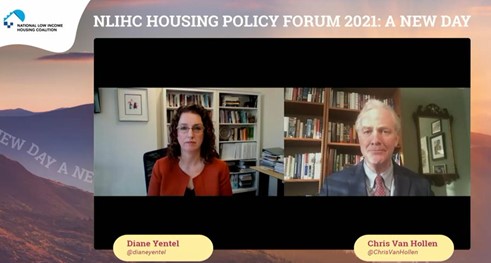
After this conversation with Senator Van Hollen, Representative Joyce Beatty (D-OH) spoke about her 30 years of work in affordable housing before coming to Congress and about her “GROW Affordable Housing Act,” which would increase funding for the national Housing Trust Fund to build more affordable housing across the country. Senate Finance Committee Chair Ron Wyden (D-OR) spoke about the committee’s efforts to include robust assistance for homeowners and individuals experiencing homelessness in the American Rescue Plan Act and committed to continuing to push for greater housing assistance in the future. Senator Rob Portman (R-OH) spoke about his efforts to prevent evictions through his and Senator Michael Bennett’s (D-CO) “Eviction Crisis Act” which establishes funding for emergency eviction-prevention assistance. Representative Mario Diaz-Balart (R-FL) spoke about the impact of the pandemic on families already struggling to stay stably housed and promised to push for strong affordable housing and resources going forward.
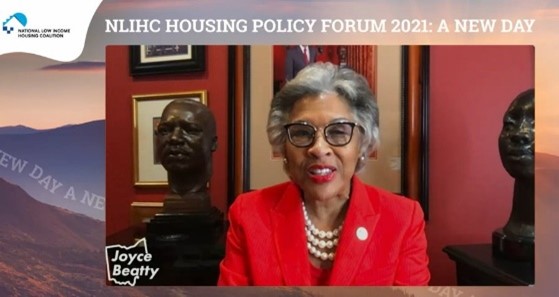 |
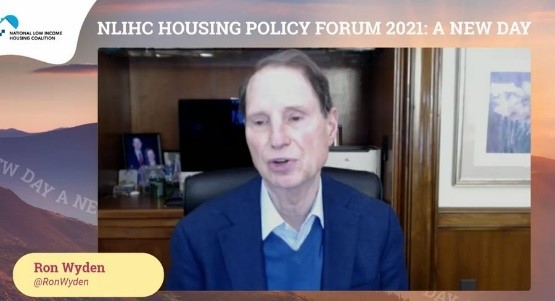 |
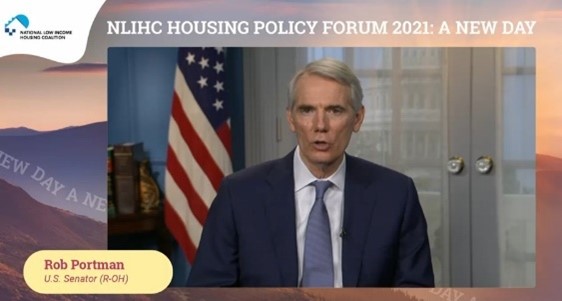 |
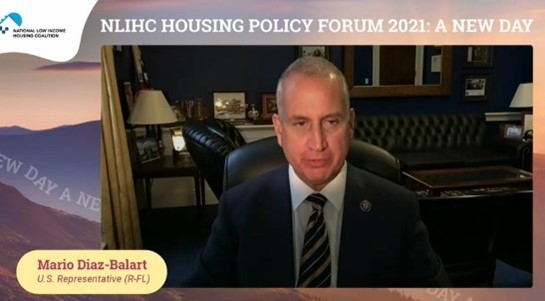 |
Senator Brian Schatz (D-HI) spoke about the problem of exclusionary zoning, which he said is “at least classist, and often racist,” calling for housing advocates to work nationally and locally to remove these harmful laws. Congressman Jesus “Chuy” Garcia (D-IL) spoke about how renters and tenants should be driving housing policy and must be “given a seat at the table” in policy discussions about how best to address the ongoing housing crisis. Senator Elizabeth Warren (D-MA) concluded the session saying she was “grateful down to my toes” to NLIHC for its work protecting renters and securing groundbreaking aid for households with low incomes. She spoke about her “American Housing and Economic Mobility Act,” which would invest in the national Housing Trust Fund. She also discussed her introduction, with Congresswoman Lydia Velazquez (D-NY), of the “Public Housing Emergency Response Act,” which would provide $70 billion to wipe out backlog of public housing maintenance and repairs. Senator Warren concluded by reiterating her intent to continue pushing for affordable housing for people with low incomes, saying, “We need to confront the affordable housing crisis head on. We’ve got to keep putting everything we’ve got into making sure that everyone has safe, affordable, housing.”
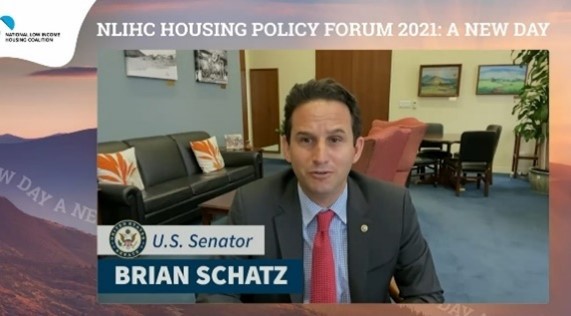 |
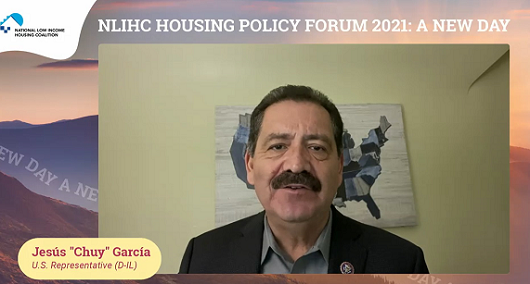 |

A session titled “Achieving Universal Housing Assistance” emphasized the importance of rental assistance for helping the lowest-income people afford decent, stable, accessible housing, reducing homelessness and housing poverty, and advancing housing and racial justice. The session featured a panel discussion with Dr. Kamillah Wood, deputy chief executive officer and chief medical officer at Children’s Health Fund; Harry Lawson, director of human and civil rights in the Center for Social Justice at the National Education Association; and Richard Cho, senior advisor for housing and services in the Office of HUD Secretary Marcia Fudge. Dr. Wood opened the session by describing the impact of housing on children’s health and connecting the racist roots of federal housing policy to the racial disparities in housing stability and health outcomes we see today. Next, Harry Lawson provided insights on how achieving universal housing assistance would improve educational outcomes, address racial equity, and impact economic stability for families more broadly. Finally, Richard Cho used his expertise on HUD programs and experience working at the local, state, and federal levels to describe the programs that could be expanded and policies enacted to achieve the goal of universal housing assistance.
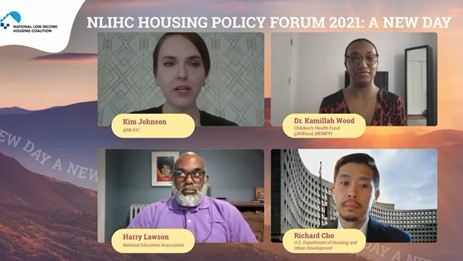
Forum attendees heard directly from Capitol Hill insiders on a panel titled “Legislative Opportunities to Advance Housing In 2021.” Beth Cooper, who works with Senate Banking Committee Chairman Brown (D-OH), and Elayne Weiss, who works with House Financial Services Committee Chairwoman Waters (D-CA), shared their priorities for a large-scale infrastructure package that could provide billions of dollars to address housing needs. Christina Monroe, who works with House Appropriations Subcommittee on Transportation, Housing and Urban Development (THUD) Chairman Price (D-NC), spoke about this year’s appropriations process and what it could mean for investments in housing. Avery Pierson from the office of Senator Rob Portman (R-OH) urged advocates to support the “Eviction Crisis Act,” a bill supported by NLIHC that would create a national housing stabilization fund to provide emergency rental assistance to households in crisis.
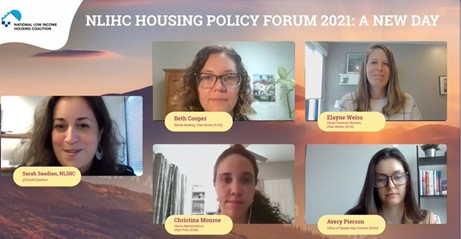
NLIHC’s 2020 and 2021 Housing Organizing Awards honorees shared strategies in a session on “Best Practices in Organizing.” The annual organizing awards celebrate important organizing achievements to advance housing policy solutions. The Housing and Community Development Network of New Jersey (HCDNNJ) was honored with the 2020 Statewide Organizing Award; Just Housing Initiative of Cook County, IL, was honored with the 2020 Local Organizing Award; Oklahoma Coalition for Affordable Housing (OCAH) was honored with the 2021 State and Local Organizing Award; and Housing Justice League in Atlanta was honored with the 2021 Renter Organizing Award. The session began with videos describing each of the winning campaign and then transition to a panel discussion among the honorees, moderated by Kalila Jackson, senior staff attorney at the Metropolitan St. Louis Equal Housing Opportunity Council and previous organizing award honoree. Staci Berger, president and CEO of HCDNNJ; Maria Moon, housing justice organizer for the Chicago Area Fair Housing Alliance; Alison Johnson, executive director of Housing Justice League; and Andrea Frymire, board member and inaugural president of the OCAH, shared key strategies they employed to successfully secure affordable housing resources, expand renter protections, prevent evictions, and support tenant organizing. They also discussed the importance of centering people with lived experience in advocacy efforts, using data for persuasive messaging, and building advocacy infrastructure for campaigns to build on successes and increase political momentum.
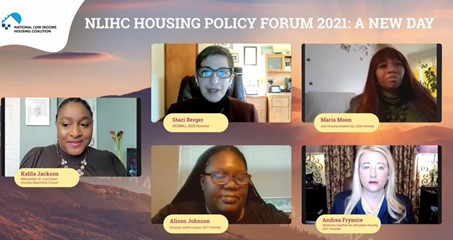
Pamela Covington and Kali Daugherty, experts on poverty with RESULTS, a movement of passionate, committed everyday people who use their voices to influence political decisions to end poverty, led a session titled “Sharing Stories of Lived-Experience to Bring About Change.” Pamela and Kali emphasize the importance of using stories to help shape socially just public policy. They guided session attendees through the process of crafting impactful personal stories for sharing in advocacy settings, such as when communicating with elected officials on Capitol Hill and in their states and communities. The presentation included tips and strategies on how to select a relevant story topic, develop a story, deliver it effectively, and incorporate a call to action. They also addressed how to ask permission to share a story, what to do you do if the person you are sharing the story with does not share your views, and how to shorten a story to fit the timeframe available with busy policy makers.
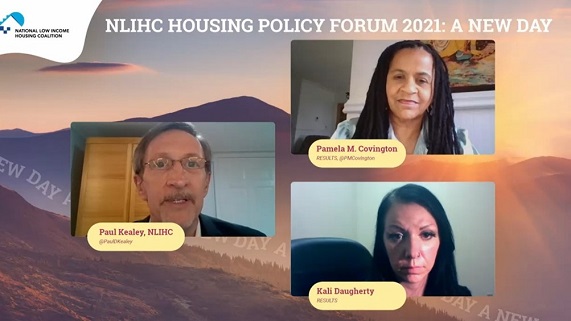
The Forum concluded with an overview of Virtual Capitol Hill Day on April 1 by NLIHC Vice President for Field and Communications Renee Wills and closing remarks from NLIHC Board 1st Vice Chair Dora Leong Gallo.
